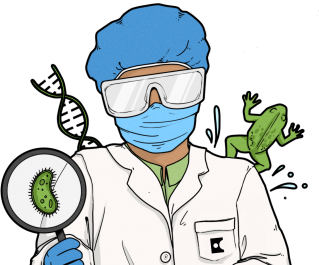What's Being a Doctor Like?
Being a doctor is a very rewarding career. However, it is also extremely challenging.
Unlike other degrees you might apply to, medicine ties directly into a specific career path. In the UK, it also binds you to a particular employer: the National Health Service (NHS)
If you're deciding on medicine, it's very important to understand the realities of being a doctor, before committing to the pathway. This includes understanding what the NHS is.
Medicine mixes scientific challenges with human interaction. It also offers a genuine chance to make a difference in people's lives.
On the other hand, being a doctor is highly stressful. There are times when you won't be able to help people and will be breaking bad news - often after long nights and working hours.
What Makes a Good Doctor?
There are certain qualities that make a good medical student and also a good doctor.
If you are deciding on medicine, it helps if you possess the following traits:
- Academic excellence
- Strong scientific ability
- Commitment
- Organisational skills
- People skills (Empathy)
- Communication skills
- Ability to work in a team
- Leadership potential
- Stress management
- Desire to learn and teach
Applying To Medical Schools
There are two different medicine course types that you must choose from before you apply to a university. These are:
- Traditional Courses are when you are taught in the classroom for the first few pre-clinical years, and then move to a clinical setting in year 3 or 4. This is only found in a handful of Med Schools
- Integrated Courses describe the approach that combines classroom and clinical environments from the start, and teaches by topic rather than discipline.
Should I Take a Foundation Year?
Foundation Courses are designed to prepare you for medical education. They can be a useful way into Medicine if you didn't get the grades required, or studied the 'wrong' subjects, or if you didn't receive the offer the first time.
Or look at Graduate Entry Medicine if you are worried about not getting into Med School with the traditional pathway.
Should I Choose an Intercalated Medical Degree?
An Intercalated medical degree, is one extra year on top of your 5-year medical degree. During this time, you're officially 'suspended' from medical school to study another undergraduate or postgraduate degree, in either year 3 or 4.
At some universities, like UCL and Imperial, this is compulsory. At others, it depends on your preference (and your grades).
How To Choose A Medical School
Our tips for choosing the right Medical School:
- Read through the entry requirements, course structure and teaching style of each medical school.
- Make a shortlist that takes into account which course structure you prefer, and whether you want a city or campus setting. Also, think about location, cost and extra-curricular opportunities.
- Select your 4 medical schools that you plan on applying to.
What Is The Medical School Application Process?
- Deciding on Medicine - making sure being a Doctor is right for you
- Doing Work Experience - finding out what it's like and strengthening your application
- Choosing a Medical School - narrowing down from 33 to your top 4
- Applying For Medical School - applying to four medical schools
- Writing a Personal Statement - writing a great personal statement
- Doing UKCAT - getting a top mark in this key entrance exam for most medical schools
- Doing BMAT - taking this second exam if you are applying to certain universities
- Passing the Interview - performing well at medical school interviews
- Starting at medical school!
How Important Are My Grades?
There are high expectations for people who want to become doctors/work in the medical field. Here are a list of the qualifications that they need to obtain:
- 7 IGCSE/GCSE, including sciences, with 5 subjects at grade 9 to 7(A* or A) and English and Maths at at least a grade 6 - 5 (B)
- 3 A-Levels at Grade A in Chemistry and either Biology, Physics or Maths, plus other academic subjects
- Work Experience
- A minimum grade of 6+ in IELTS (Only if English is not your native/first language)
What is a Medicine Personal Statement?
A Personal Statement supports your university application. It's designed to help universities choose the best candidates. More specifically, a Medicine Personal Statement is your chance to highlight any of your skills or qualities that you need to be a Doctor, and write about your motivation to study Medicine.
Your Medicine personal statement will need to be 4,000 characters - roughly 500 words over 47 lines.
Your Medicine Personal Statement should include the following three components:
- Motivation - Why do you want to study Medicine?
- Exploration - What have you done to learn about it?
- Suitability - Why are you a great fit for Medicine
The structure of your personal statement is a matter of personal preference, but we suggest the best format is to cover the following points.
- Why do you want to be a Doctor? (motivation)
- Work experience - and what you learnt from it (exploration)
- Volunteering (exploration)
- Wider reading and study (exploration)
- Extracurricular (suitability)
- Conclusion (motivation)
What Admission Test do I Need?
If you are applying to study in the UK, you will need to take either the University Clinical Aptitude Test (UCAT) or BioMedical Admissions Test (BMAT) as part of the admission process. You may prefer to focus on one of these tests, which means you'll need to look at UCAT Universities or BMAT Universities.
If you are applying to study in the US, you will take The Medical College Admission Test (MCAT). Almost all US medical schools require applicants to submit MCAT exam scores during their university application.
If you are planning on applying to study in other countries, look at the requirements section on the universities' website.
Medical School Interviews
If you pass the first stage of the admissions process (the academic screening) you'll get an invite to a Medicine interview. This is your chance to showcase your personal qualities that are aligned with those of a good Doctor, and to demonstrate your skills.
There are two types of Medicine Interviews:
- Multiple Mini Interviews: this involves rotating through a series of stations where you will face a variety of challenges and types of questions or tasks
- Traditional/Panel Interviews: Focuses on you answering multiple questions over a much longer period of time.
These tips will help you prepare for your Medicine Interview:
- Practise common Medicine Interview Questions
- Revise the hot topics that you are expected to know about
- Keep up-to-date with the current news in Medicine
- Look at the MSC's info sheet about what makes a good Doctor
- Review the course information and research into the Medical School
How Much Does Medical School Cost?
As a medical student, you will have two main costs to meet: tuition fees and living expenses. There may also be extra course costs, for example if you choose to take elective courses. But for now let's focus on the basics.
Most medical schools in the UK charge tuition fees of £9,000 per year. This may seem like a lot, but every full-time UK student is entitled to a Tuition Fee Loan to fund these costs.
You can simply apply for a loan even if you haven't received an offer yet. The process is quite simple:
- Start by setting up a Student Finance online account
- You may need to provide evidence of your household income and some other important information from your parent/guardian.
- You may need to send proof of identity.
Can I Get Help With Living Expenses?
On top of the university fees, you will need you will need to work out how much you expect your living costs to be. These will include things like accommodation, travel, course material and books.
All undergraduate students are eligible for maintenance loans and can apply for these through Student Finance.
How Can I Prepare For Medical School?
Over the summer break after A-Levels, you may start to wonder how you can prepare for starting medical school. You may have preconceptions of what studying Medicine is like. Perhaps you have concerns about what your seminars might entail. This is a very normal feeling!
How Does Studying Medicine Differ From A-Levels?
A common worry among students starting medical school is how the workload will differ and how to adapt to a new place of learning.
You will cover many topics at a much faster pace, and in much more detail than at A-Level. You'll also be expected to work independently. So, you'll need to be self-motivated in your study and revision.
The key thing to remember is that it's normal to find it difficult to adjust at first. Everybody else will be feeling the same pressure. Secondly, you were made an offer because your admissions tutor had faith that you have the skills, attributes and dedication needed for medical school.
The overwhelming likelihood is that you'll soon adapt to a new learning style. So try not to worry too much about it in advance.
What Will My Timetable Look Like?
Each medical school will differ in the structure of the course. For example, some may have a combination of PBL sessions, tutorials and lectures. You can usually find a rough idea of what your timetable will look like on the medical school's website.
What If I'm Finding It Really Hard?
Everybody finds medical school challenging at first. It can be difficult to live away from home, in a new city, with an enormous-looking syllabus to tackle.
If you're struggling with your course, workload, or simply being away from family and friends, speak to your personal adviser, on-campus GP, or friends on your course. They will all be more then happy to help you and make you feel more comfortable settling in.
What Happens After Medical School?
Now you're really looking ahead! After you finish medical school, it's time to begin your career as a junior doctor. Foundation training is the first step along the postgraduate training pathway, and will last for two years.


 ENG
ENG
.png)
